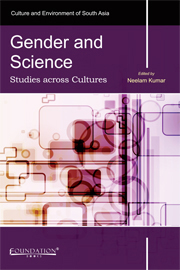Conclusion: The Persistent Patterns!
Published online by Cambridge University Press: 05 May 2013
Summary
Historical participation by women in science and technology has been persistent but with inconsistent patterns because of the social, economic, and intellectual obstacles that have stood in their way.
(Kohlstedt, 2004: 1)What Kohlstedt (2004) opines about the history of women in science continues to be true even in the twenty-first century. Modern science was born as an exclusively masculine activity. By excluding women during its professionalisation, the world of science resulted in the association of ‘man’ and ‘scientist’. Changes did occur, but science remains gendered and social and cultural barriers do stand in the way to women's participation in (and within) science and technology. There has been enormous increase with more women studying science and getting engineering education all over the world. But is there a proportional increase in the scientific professions and faculty appointments, especially at the higher echelons? Although the gender gap is slowly diminishing, increase in the absolute numbers or proportion of women receiving graduation, postgraduation or doctorates do not tell the entire story! Globally, women account for slightly more than one-quarter of the researchers. In 121 countries with available data, women represent slightly more than one-quarter of researchers (29 per cent). Women continue to be clustered in lower academic positions and relatively fewer at the higher ranks. According to the reports by the National Science Foundation in the US, around 19 per cent of the professorship was held by women in the year 2006.
- Type
- Chapter
- Information
- Gender and ScienceStudies across Cultures, pp. 293 - 300Publisher: Foundation BooksPrint publication year: 2012



